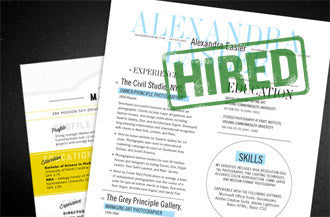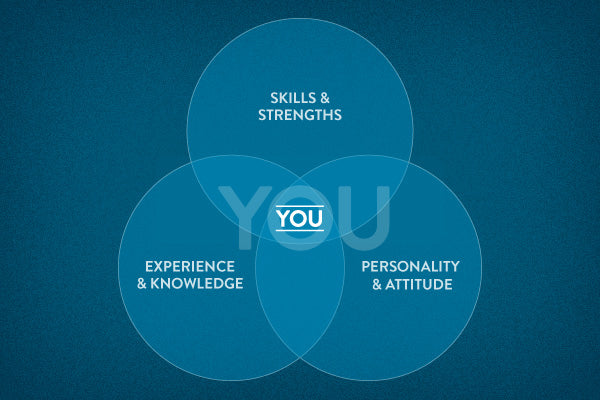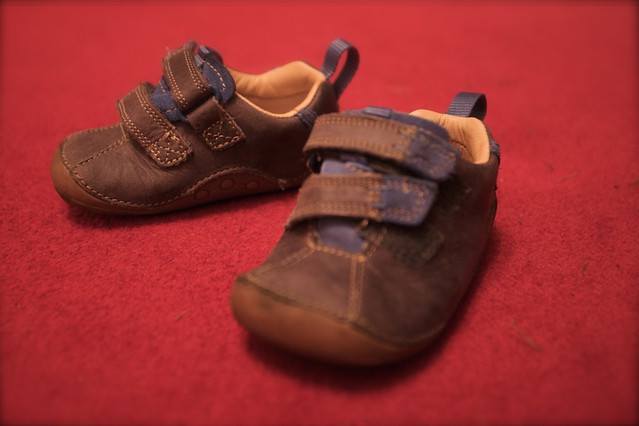Blog
Judging A Book By Its Cover

Tips for Selling Your Own Story
No matter how many times your mom told you not to judge a book by its cover, it’s still one of life’s inevitable occurrences. Luckily, by thinking of a hiring manager as someone browsing a bookstore, you can make a great impression with three easy strategies.
Grab their attention.
Once a hiring manager has found the right “genre,” in this case a pool of qualified applicants, they’ll start perusing the shelves for something that looks interesting. Think of your resume as your professional dust jacket. It doesn’t matter how great your story is if no one ever picks it up. In a sea of Times New Roman and Helvetica, a well-designed resume is an easy way to set yourself apart and make recruiters want to pull your book off the shelf. Plus, an excellent design can speak volumes about your personality, organization skills and taste before a recruiter ever reads a word.
Get to the point.
The text of your resume functions as the blurb, and nothing is more frustrating than flipping a book over only to find that you still have no idea what the story is about. Be sure to include as much detailed information about yourself as concisely as possible. Talk about your experiences and the direct results of your actions. Being able to quantify your skills will help hiring mangers determine if your return on investment is more valuable than that of the next person.
Give them a reason to believe.
Finally, include an “about the author” section — or in this case, a cover letter. Just as every book has an author bio, so should every job application include a cover letter. This is your chance to tell employers why you would be a good fit and to frame your experience within the context of their company. And don’t be too humble to include a “praise for” section, either. Just as you’re more likely to pick up a book with a quote from the New York Times, recruiters are much more likely to respond to someone who mentions that they have been referred by an employee or an acquaintance than to take a chance on a complete stranger.
Don’t be daunted by the thought of limiting your story to one or two pages. With a little bit of creativity, you can take that simple piece of paper and turn it into a ticket for an interview. X
- Author Dat Le
- Category Career AdviceFirst ImpressionGet The JobInterview TipsJob AdviceLife LessonResume AdviceResume ContentResume Tips
- Comments 0
Preparing for a mid-life career change
Many people find that middle age is a natural reflection point on what they have been doing in their life, including the field that they have been working in. It can be a great time to make a change in your career, especially if you have not been happy with your work situation.

Here are some tips to help you make a mid-life career change.
Do some volunteer work in the field
It can be hard to get an entry-level job as a middle-aged person, especially if people are not clear about why you are swapping careers. Doing some volunteer work is a great way to show that you have put some consideration into moving into the new field and that you are committed to working in this area. It can also be a good way to narrow down exactly what kind of jobs or workplace you are looking for and can also be a great way to get a reference for your job applications.

Get professional help redesigning your resume
As many of your previous roles and responsibilities won't align that well with your new field, you will need to describe your duties in each role to show that your other career has helped you to develop other useful skills. Skills such as time management, leading a team, working with difficult people and managing processes and procedures are all skills that stretch across different industries and which might be useful to a new employer as well. A professional resume service, such as Loft Resumes, can be a great help as they can help to craft a resume that highlights your most relevant skills and training.

Stay positive
It can be hard get your foot in the door and to change careers, so try to stay positive. You may need to apply for more jobs and go to more interviews before you get your first job offer. Remember to stay positive and thank people for their time and consideration, as you may run into them in the future if you stay in the industry for a while. A positive attitude can go a long way in helping people to remember you for future job openings.

If you're looking to change careers, you'll need a new resume. Get in touch with us today to find out how we can help.
- Author Nicole C
- Category Career Advice
- Comments 0
How to Make Friends at a New Job

Congratulations! You’ve done it. You’ve landed a new job! (Maybe you even used a Loft Resume, which got your foot in the door?) There are many joys that come with a new job especially if you’ve experienced a time of unemployment. A new job could feel like your saving grace. Hey, maybe it IS your saving grace? Although there’s much that could be discussed in regards to starting a new position, one topic that shouldn’t be over looked is making friends in your new work place. Perhaps making friends comes naturally to you and you’re used to being the most liked person in the office. Even so, it’s never a bad idea to be reminded of a couple of good habits and best practices for your first day in a new environment.
Before your first day, be prepared to answer the same few questions over and over again. For example: Where did you work before? How did you come about getting hired here? What’s your background in? Do you like it here so far? More specifically, be prepared to answer every inquiry with a smile and a question in return. Even if someone brings up a sensitive subject, keep the conversation light and remember that everyone’s favorite subject is really him or herself. If there’s something you don’t want to talk about, simply turn the conversation around. This will help you avoid an awkward situation and will easily help you win some new office buddies. Some people may jump right in and ask if you’re on Facebook so they can befriend you. If you don’t like befriending workmates in this way, then we suggest having a graceful answer or alternative. Linked In or Google Plus accounts can come in handy for these types of situations and are also great ways of networking.
If you receive invitations to join a group for lunch then be sure to go along. Even if you’ve already packed a brown bag full of your favorite left overs, it’s a good idea to accept these invitations regardless. Don’t worry, that spaghetti pie will only get better. Unfortunately lunches can also be a time of gossip and business bashing. Take our advice from the previous paragraph and master the skill of changing the subject. There’s no worse way to start a job with a new company than to learn why the current employees are not happy with said company. This is a fresh start for you and could be the same for them. Use lunches and break times to learn the names and interests of your fellow coworkers and develop a sincere interest in other people. Remember, when it comes to making new friends, it’s important to be a better listener than talker.
So, there’s a few insightful ways to help get you through your first days at a new job. If you’d really like to master the art of interpersonal skills just look to Dale Carnegie. His book, How to Win Friends & Influence People is full of priceless knowledge. This book holds many nuggets of wisdom and advice, but here are some of the best tips summarized for your convenience: Become genuinely interested in other people. Smile. Remember that a person’s name is to that person the sweetest and most important sound in any language. Be a good listener and encourage others to talk about themselves. Talk in terms of the other person’s interest. Make the other person feel important and do this sincerely.
Follow these basic guidelines and your first days are sure to be a social success!
- Author Emory Cash
- Category Career AdviceFirst ImpressionFirst JobLife Lesson
- Comments 0
An Offer is Just a Starting Point: Tips for Negotiating a Higher Salary
For many job-seekers, the excitement that comes with receiving a job offer is tempered by the anxiety-inducing salary negotiations that go along with it. In today’s economic climate, so many of us have heard, “You’re just lucky to have a job!” so much, we’re nervous about pushing our luck when it comes to money. The negotiation process can be particularly nerve-wracking for people just beginning their careers, but even the more experienced among us get weak in the knees just thinking about haggling over compensation with their future boss.

The thing is, most employers expect you to respond to their initial offer with a counter-offer. Think about it. Who would you rather have work for you—someone who meekly accepts every proposition, no matter what, or someone who has the knowledge and confidence to negotiate the best possible outcome? Besides, if a company wants you to work for them badly enough to make you an offer, they’re not going to yank it off the table just because you asked them to reconsider terms. So take a deep breath, arm yourself with knowledge, and let’s make a deal.
Be informed. Get educated about the salary you can expect for your level of experience and education in your field in your region. There are lots of online salary calculators out there (salary.com is one that comes up a lot) to help you with your research. You can also ask trusted contacts within your field for a reasonable range, which may give you a more accurate picture, especially if you’re asking people within your search area. Know what you’re willing to accept going in, and have a number in your head you absolutely won’t go below. Be realistic, but don’t low-ball yourself. It’s a delicate balance, and the reality is that the end result will probably fall somewhere between the number you ask for and your floor.
Get them to make the first move. You’re better off if they throw out the first number, because that gives you a sense of where their heads are, but this isn’t a hard-and-fast rule. If they ask you for a range and you sidestep the question, you run the risk of seeming A) shady or B) uninformed. You can either ask them what they have in mind, or refer to the above and tell them your range.
Take a breather. When they make the offer, express how happy and excited you are about the position, then tell them you’d like consider the official offer and call back. Once you see something from HR, you can call and negotiate. Here’s where you want to make your polite, professional case for the salary you want, based on your research and the value you can bring to the company. Once you’ve done so, stop talking. The ball is in their court.
We know it’s scary, but you have nothing to lose and lots to gain. Go get ‘em, tiger.
- Author Nicole Cash
- Category Career AdviceFirst ImpressionFirst Jobjob offerLife LessonNegotiationsSalary
- Comments 0
An Offer is Just a Starting Point: Tips for Negotiating a Higher Salary

For many job-seekers, the excitement that comes with receiving a job offer is tempered by the anxiety-inducing salary negotiations that go along with it. In today’s economic climate, so many of us have heard, “You’re just lucky to have a job!” so much, we’re nervous about pushing our luck when it comes to money. The negotiation process can be particularly nerve-wracking for people just beginning their careers, but even the more experienced among us get weak in the knees just thinking about haggling over compensation with their future boss.
The thing is, most employers expect you to respond to their initial offer with a counter-offer. Think about it. Who would you rather have work for you—someone who meekly accepts every proposition, no matter what, or someone who has the knowledge and confidence to negotiate the best possible outcome? Besides, if a company wants you to work for them badly enough to make you an offer, they’re not going to yank it off the table just because you asked them to reconsider terms. So take a deep breath, arm yourself with knowledge, and let’s make a deal.
Be informed. Get educated about the salary you can expect for your level of experience and education in your field in your region. There are lots of online salary calculators out there (salary.com is one that comes up a lot) to help you with your research. You can also ask trusted contacts within your field for a reasonable range, which may give you a more accurate picture, especially if you’re asking people within your search area. Know what you’re willing to accept going in, and have a number in your head you absolutely won’t go below. Be realistic, but don’t low-ball yourself. It’s a delicate balance, and the reality is that the end result will probably fall somewhere between the number you ask for and your floor.
Get them to make the first move. You’re better off if they throw out the first number, because that gives you a sense of where their heads are, but this isn’t a hard-and-fast rule. If they ask you for a range and you sidestep the question, you run the risk of seeming A) shady or B) uninformed. You can either ask them what they have in mind, or refer to the above and tell them your range.
Take a breather. When they make the offer, express how happy and excited you are about the position, then tell them you’d like consider the official offer and call back. Once you see something from HR, you can call and negotiate. Here’s where you want to make your polite, professional case for the salary you want, based on your research and the value you can bring to the company. Once you’ve done so, stop talking. The ball is in their court.
We know it’s scary, but you have nothing to lose and lots to gain. Go get ‘em, tiger.
- Author Emory Cash
- Category Career AdviceFirst ImpressionFirst JobLife LessonSalary
- Comments 0
You, The Brand

You’ve heard it before, but it’s worth repeating: there is only one you. Now, don’t quote us on this, but we’re pretty sure that makes you about as valuable as the Mona Lisa (there’s only one of her, too.) No one else can offer the unique combination of skills and personality traits you can bring to the table. That one-of-a-kind combo is what constitutes your personal brand.
When you’re building your career, a good way to get noticed is to think of yourself as a brand. A personal brand is simply what you want people to think about you. Every piece of communication you put out there for potential employers to see should tell that story—your website, your (public) social media profiles, and of course, your cover letter and resume. It’s no different than any other kind of advertising, except in this case, you’re the product. So how do you start creating your brand story?
Know yourself: Your first step is to figure out exactly what you offer. You should be able to state it succinctly, meaning in a single sentence or less. It’s not enough to just be a photographer or a wedding planner or an accountant. You have to isolate the unique combination of skills and personality traits that sets you apart from all of the other photographers/wedding planners/accountants. Then you have to tell people about it.
Find your strengths: Start by talking to your friends, colleagues, professors, group members, and anyone else who has worked closely with you and knows you well. They’ll see your strengths in a completely different light than you do, and talking to them will probably help you uncover some positive attributes you never knew you had. You might also consider taking a personality inventory like the Myers Briggs test. It’s not a crystal ball, but it can reveal things about your personality and leadership style that can help you formulate your personal brand. You can also make a mood board as an exercise to focus your personal brand concept.
Know your audience: To make your brand work its hardest for you, you have to know who you’re talking to. Think carefully about the kind of person or company you want to work for, and tailor your personal brand to appeal to them. What do they need in an employee? What unique niche can you fill? Answer these questions, and then build your brand accordingly.
For more in-depth personal brand-building tips, check out this article.
- Author Emory Cash
- Category Career AdviceCover LettersResume Advice
- Comments 0
Totally Desperate Job-Hunting Attempts That Actually Worked

In total, 13.1 million Americans are out of work—more people than live in Beijing or Sao Paolo. The city proper populations of New York and Los Angeles combined do not equal the unemployed population in America. Over four million of those job seekers have been unemployed for more than a year, and some are resorting to some pretty bizarre tactics in order to attract employers’ attention. Here are some wild job-hunting stunts that actually landed a job:
Tempting Fortune: Samantha Goldberg now works in television, but several years ago, she was trying to get a sales job at a Chicago boutique. She included a fortune cookie with her resume and cover letter. The fortune said: “If you hire me today, I promise good fortune with your sales.” The owner gave her the job but unfortunately the business closed down a year later. Goldberg says she still uses the fortune cookie stunt to add flare to proposals at her current job.
Help a Guy Out: Peter Shankman, who now runs HARO.com, a successful web service for journalists (HARO stands for Help A Reporter Out), was so desperate for work back in 1997 that he spent 12 hours on a cold New York City street corner wearing a sandwich board with his resume on it. He handed out 1000 resumes, got 479 calls, 78 interviews and 37 offers. The long, cold day landed him a job with the New Jersey Devils working on web policies.
Highway Bribery: Javier Pujals walked around Chicago wearing a sign that said: “Will Buy Interview.” He also created a site called Buyaninterview.com. According to forbes.com, Pujals' sign got him exposure from local media, and within a month, he had four job offers without actually ever paying for an interview.
Will Pay for a Lead: CNN Money reported on Jacob Share, 33, who sent his resume out to friends and family and asked them to send it out to their contacts. Share offered a $150 reward to whoever led him to a Web development manager position. He quickly got a job from one e-mail forward from a friend.
Google It: Alec Brownstein got hired after buying a Google ad targeting five creative directors who worked at his top-choice firms. He paid 15 cents an ad to move his ad up to the top of the list when the executives googled their own names. When Ian Reichenthal of Young & Rubicam saw the ad, he called Brownstein for an interview and later hired him.
Bright Lights, Big Job: Last December, Liz Hickok strung holiday lights on her house in Alpharetta, Georgia that read: "My wish, HR job, Liz Hickok, Linked In." According to CBSAtlanta, Hickock has gotten attention from employers as far away as Italy, but she is sifting through LinkedIn views and offers to find the right opportunity in Atlanta.
- Author Emory Cash
- Category Career AdviceFirst ImpressionGimmicksResume Advice
- Comments 0
Don't Let Your Cover Letter Blend In

Photo by cinnamon girl
Agency Spy posted a pretty dead-on universal cover letter that made us laugh because it’s A) funny and B) instructive. Let’s go through it and see what we can learn, shall we?
Zany greeting no one uses in real life!
Even if you’re applying for a job in a creative field, don’t get too wacky in your cover letter. Your personality should show, but remember that you’re making a first impression, and you should come across as a professional.
Introduction to myself in case you can’t read who this email is coming from. Brief background about myself because the only way I “know” you is by 5 degrees of LinkedIn separation.
You do have to introduce yourself, of course, but try to let your personality shine through. Remember, hiring managers read an awful lot of these things, so you want to make it interesting. Think about your audience and what they want to know about your background, and tailor your introduction accordingly.
Sentence full of innuendo that boils down to me being unemployed. Predictable comment about how your agency and me belong together, ignorant to the fact you are probably friends with several other recruiters I’m sending this exact letter to. Generic compliment that applies to every agency but, for the purposes of this email, “specifically” yours.
We all know we should be writing a new cover letter for every job we apply for, but does anyone actually do that? If you ask us, a lot more people should. Writing your cover letter specifically for the job you want allows you to make a case for why you’re the best candidate for that position. This is a great opportunity to sell yourself; don’t waste it.
Let’s talk about me some more, because I’ve forgotten all of the following information is on my resume, which I made in Microsoft Word even though I call myself creative.
By all means, be sure your resume stands out in a sea of boring Word docs—especially if you’re going into a creative field. We can help.
I’ll make a list here in paragraph form, beginning with the college I went to that taught me nothing applicable to this position. This would be the perfect place for an unfunny joke about how good the football/basketball team is going to be this year! Giant stretch here talking about my experience, because this position I’m emailing about requires 3 more years of experience than I really have.
Don’t waste space in your cover letter by restating your resume. Instead, use this opportunity to explain what those experiences have taught you and why they make you the best candidate for the position. Also, don’t overstate your qualifications. Just use your actual experiences—professional and otherwise—to make a convincing case.
Here is where I mention the name of someone you actually may know in real life, who gave me his business card once in college. I hope the name drop makes you more likely to respond to me, but what I don’t know is that guy I just mentioned got let go 8 months ago. Plus, he was kind of a [jerk]. It is now clear just how desperate I am.
Don’t be desperate. If you do happen to have a connection, you can bring it up in the letter or include that person as a reference, but make sure it’s a good, solid connection and not just some guy you met once. It’s also a good idea to get in touch with anyone you plan to name-drop to make sure that person is OK with it. You don’t want them to be blindsided if they get called for a reference, especially if they have no idea who you are.
A one word, drinking based farewell that implies I’m a fun person, and a wish that I hear from you soon.
“Sincerely” will do just fine. Remember that this is still a professional letter; don’t get too casual.
A warning/threat that I will follow up with another template email in a week if I don’t hear back from you.
It’s fine to touch base, but bugging them can be off-putting. Follow up with care.
I hope at this point that you haven’t realized I’ve spent 30 minutes writing this, but not 30 seconds proofreading it.
Please proofread your letter. Do you really want a misspelled word to be the reason your resume goes into the reject pile?
-First name
And last name. Again, professional. Plus, it can’t hurt for them to read it a couple of times so they remember it.
What’s the takeaway here? Hiring managers see roughly a million cover letters a day (probably not, but we’re sure it feels that way.) Avoid falling into these traps to make yours stand out.
- Author Emory Cash
- Category Career AdviceCover LettersFirst ImpressionResume Advice
- Comments 0
Giving Your Stalled Job Search a Jumpstart.

Photo by steguis
So, you've been job-hunting for a while, and you've hit a dry spell. Your interview suit is gathering dust, your diet consists mainly of Froot Loops, and you're way too invested in daytime television. Your search needs to see some action, and soon. Here are a few tips to give it the boost it needs.
Rethink your cover letter.
Be honest. Are you sending the same cover letter to every company? We know, it's much easier to copy and paste, but if you bait your hook well, you might get more bites. For every job you apply for—or at least the ones you really want—write an individualized cover letter telling them why you're the perfect candidate for their business. People know a form letter when they see one, so give them a personalized letter that stands out.
Use your network.
If you've just been trawling online job postings, you aren't taking full advantage of what's really out there. Most people get jobs through people they know. So go through your Facebook profile, flip through your church directory, ask your friends. Don't feel badly about requesting help from people you're only slightly acquainted with, either. The worst they can do is say no. Also, get yourself to as many networking events as you can. You never know who you might meet.
Ask for an informational interview.
Just because a company isn't ready to hire now doesn't mean they won't be ready to hire in the future. Ask for an informational interview to introduce yourself and learn more about the field you're interested in. Even if it doesn't result in a job, you'll get valuable interviewing practice and potentially make connections that could get you hired in the future.
Build your skillset.
Are you seeing skills that you don't have requested in job listings? While you're looking, take the opportunity to build those up. If the jobs you want request social media expertise, for instance, get a Twitter and a LinkedIn profile and read up on innovative ways to use them. If employers want someone with event planning experience, volunteer with an organization that will help you bulk up your resume. Read. Research. Give yourself the knowledge to shine more with every interview.
Broaden your search.
We're not in the business of crushing dreams here, but setting your job search parameters too narrowly can hold you back. If you refuse to consider any opportunity that isn't a Fortune 500 company in Manhattan, for instance, it goes without saying that you're limiting your options. We're not suggesting you lower your standards, but it can't hurt to expand your idea of what kind of offer you'd be willing to take, whether that means a lower salary, a smaller city, a less well-known company or a different position.
Don't give up.
It's tough out there. On average, it takes seven months or more to find a job in today's economy. Ugh. It's easy to start to feel hopeless, but chin up. The right job will come along, especially if you take the right steps to find it.
- Author Emory Cash
- Category Career AdviceCover LettersJob LeadsSocial Media
- Comments 0
Tiny Shoes and Other Gimmicks

Photo by Alastair Humphreys
Someone we know once received a package at his office that contained a baby shoe and a note that said, “I'll do anything to get my foot in the door!” There may have been a resume and a cover letter buried in there, but our friend's office was so amused (and not in a good way) by the baby shoe thing that the important stuff was completely overlooked. But even if it hadn't been, who wants to be the person who hired the baby shoe guy?
Creativity isn't a bad thing, and the baby shoe guy was obviously committed enough to getting the job to put time and effort into his presentation. His problem was that his gimmick undermined the substance of his resume. The overall feeling in our friend's department was that baby shoe guy didn't have a lot to offer in the way of actual experience, so he used an attention-getting tactic in the hope that they wouldn't notice he wasn't particularly qualified. That's the trouble with using gimmicks: they automatically suggest that someone is trying to put one over on the people doing the hiring. “Hey, look at this cute thing!” it says. “Please don't notice that my cover letter is written in crayon!”
“Hey, wait a minute,” you might think. “Aren't your fancy resumes just another example of this?” That's a question we hear occasionally, and it's a good one. The way we see it, the defining quality of a gimmick is the element of subterfuge. If you're flashy enough with your baby shoe or your cookie bouquet or YouTube video or whatever, maybe no one will notice your shortcomings.
A well-designed resume, on the other hand, is meant to highlight your qualifications. Our layouts bring the story of your career to life using proven design principles. If your qualifications are solid, we contend that a well-designed resume is the frosting on the cupcake of your professional achievement. However, if you majored in underwater basket weaving and your most impressive accomplishment is playing Call of Duty for 14 hours straight, there is no font, no color combination, no design element that can convince someone to hire you.
- Author Emory Cash
- Category Baby ShoesCareer AdviceGimmicksResume AdviceResume Content
- Comments 0